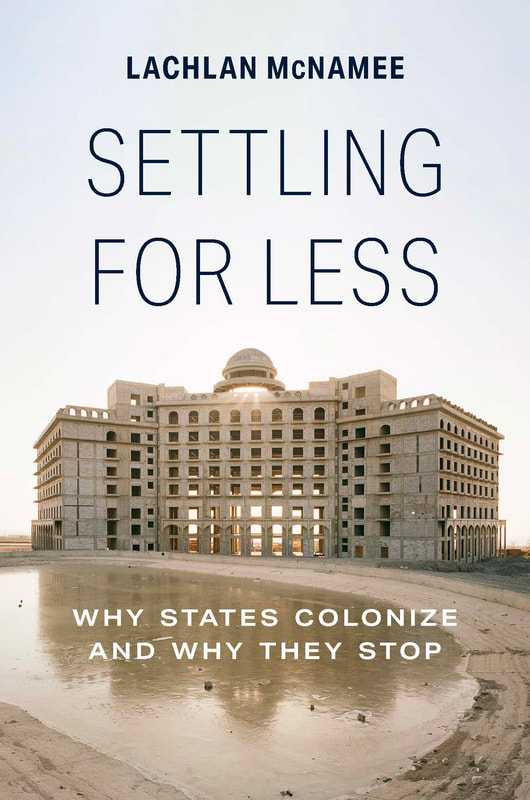Settling for Less: Why States Colonize and Why They StopPrinceton University Press, 2023
Over the last past few centuries, vast areas of the world have been violently colonized by settlers. But why did states like Australia and the United States stop settling frontier lands during the twentieth century? At the same time, why did states loudly committed to decolonization like Indonesia and China start settling the lands of such minorities as the West Papuans and Uyghurs? Settling for Less traces this bewildering historical reversal, explaining when and why indigenous peoples suffer displacement at the hands of settlers. Lachlan McNamee challenges the notion that settler colonialism can be explained by economics or racial ideologies. He tells a more complex story about state building and the conflicts of interest between indigenous peoples, states, and settlers. Drawing from a rich array of historical evidence, McNamee shows that states generally colonize frontier areas in response to security concerns. Elite schemes to populate contested frontiers with loyal settlers, however, often fail. As societies grow wealthier and cities increasingly become magnets for migration, states ultimately lose the power to settle frontier lands. Settling for Less uncovers the internal dynamics of settler colonialism and the diminishing power of colonizers in a rapidly urbanizing world. Contrasting successful and failed colonization projects in Australia, Indonesia, China, and beyond, this book demonstrates that economic development—by thwarting colonization—has proven a powerful force for indigenous self-determination. A component of this book was recently published in International Organization. For more, please see Research. |
Advance praise
“This beautifully written book delivers on its great ambition. With impeccable scholarship, a deeper reading of the cases, and a dedication to the evidence—quantitative and qualitative--Settling for Less questions the received wisdom not only on colonization but also on modernization.”—Claire Adida, author of Immigrant Exclusion and Insecurity in Africa
“A bold, provocative, and fascinating reassessment of the logic of colonization that challenges conventional wisdom and places a fraught and sensitive concept under a new light.”—Stathis Kalyvas, University of Oxford
“This lucid book transforms colonialism from an epithet into a strategy intertwining colonial states, settlers, and natives while demonstrating that the state’s control over the colonial process is imperfect, decreasing with economic growth. Turning Lenin on his head, McNamee shows that ‘decolonization, not imperialism, is actually the highest stage of capitalism.’ The book represents the highest stage of social science history.”—David D. Laitin, Stanford University
“When and why do states send settlers to distant lands? In this incisive book, Lachlan McNamee provocatively argues against the view that settler colonialism is driven by economic imperatives, showing instead that it occurs in response to indigenous resistance and rebellion. Thoughtful, exceedingly well-written, and persuasive, Settling for Less upends the existing wisdom on colonization and decolonization. It is essential reading.”—Adria K. Lawrence, author of Imperial Rule and the Politics of Nationalism: Anti-Colonial Protest in the French Empire
“Reminiscent of instant classics, this gripping book finds that economic development, not democratization or ideological change, ends the practice of settler colonialism. The logic of the argument is counterintuitive: rising wealth reduces the capacity of states to pacify diverse frontiers through colonization.”—Harris Mylonas, author of The Politics of Nation-Building
Reviews (linked)
Political Science Quarterly
Perspectives on Politics
Choice
Studies of Transition States and Societies
International Affairs
The Developing Economies
“A bold, provocative, and fascinating reassessment of the logic of colonization that challenges conventional wisdom and places a fraught and sensitive concept under a new light.”—Stathis Kalyvas, University of Oxford
“This lucid book transforms colonialism from an epithet into a strategy intertwining colonial states, settlers, and natives while demonstrating that the state’s control over the colonial process is imperfect, decreasing with economic growth. Turning Lenin on his head, McNamee shows that ‘decolonization, not imperialism, is actually the highest stage of capitalism.’ The book represents the highest stage of social science history.”—David D. Laitin, Stanford University
“When and why do states send settlers to distant lands? In this incisive book, Lachlan McNamee provocatively argues against the view that settler colonialism is driven by economic imperatives, showing instead that it occurs in response to indigenous resistance and rebellion. Thoughtful, exceedingly well-written, and persuasive, Settling for Less upends the existing wisdom on colonization and decolonization. It is essential reading.”—Adria K. Lawrence, author of Imperial Rule and the Politics of Nationalism: Anti-Colonial Protest in the French Empire
“Reminiscent of instant classics, this gripping book finds that economic development, not democratization or ideological change, ends the practice of settler colonialism. The logic of the argument is counterintuitive: rising wealth reduces the capacity of states to pacify diverse frontiers through colonization.”—Harris Mylonas, author of The Politics of Nation-Building
Reviews (linked)
Political Science Quarterly
Perspectives on Politics
Choice
Studies of Transition States and Societies
International Affairs
The Developing Economies
